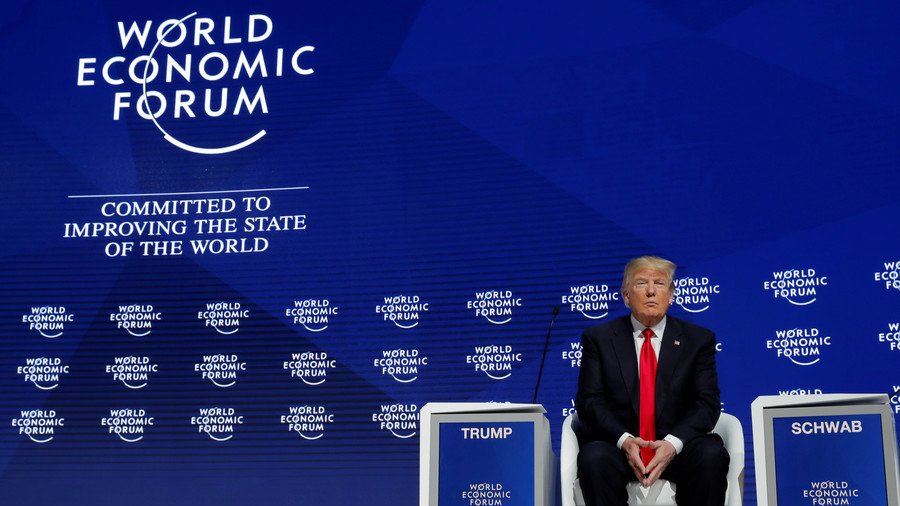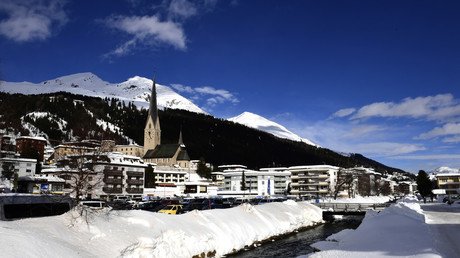‘Davos billionaires want business as usual, but world’s problems need scientists & engineers’

Billionaires at Davos made their fortunes on the pre-2008 bubble and are neither willing or qualified to solve actual world problems like the future of energy, Steve Keen, professor of economics at Kingston University, told RT.
Donald Trump on Friday addressed political and business elites who gathered at the World Economic Forum in Davos, Switzerland. The US President talked up his vision of protectionist trade policies, tax cuts and deregulation.
RT: How would you assess Donald Trump’s economic policies? Is he doing as much good for America as he claims?
Steve Keen: Of course not. He always dramatically exaggerates everything. It’s been his business practice all the way through. And he got quite a bit of bad press from that in New York for quite some time before he ran for president. But I am actually in favor of his industrial attitudes, because he doesn’t see free trade as being a vehicle of growth. Frankly, when you look at the economic theory behind it, it is nonsense … What gives you growth is investment and industrialization. To some extent what he is doing may help America invest slightly more.
But the rest of what he is doing is so destructive. To even invite foreigners to come to America and say: “Come over here and innovate” when they know they face the most draconian immigration regime in America’s history is rather ironic … the irony of that is surely lost on Donald Trump.
Lights go out on Biden as he talks of US ‘leadership’ in #Davos speech https://t.co/pb0pWkVCwdpic.twitter.com/LRDJaEv3op
— RT (@RT_com) January 18, 2017
RT: What have been your thoughts on this summit? Should emphasis be on a pro-globalization, pro-growth agenda in the world right now?
SK: Not pro-globalization. Globalization does not lead to growth – it actually leads to Rust Belt states, as we’re seeing in America, and polarization with more income going to capitalists, and less going to workers over the globe, even though workers in the Third World might benefit. And a major fact that is not even being considered by the people in Davos right now – is the impact of us slowly finding it more and more expensive to get oil out of the ground, which is by far the real engine of growth in the economy – is actually turning that oil into energy. And the amount of fringe that is being left right now is diminishing. That is probably one of the two major economic crises confronting the global economy in the next ten years. And it is not even being discussed in Davos.
'They’re hiding from a real discussion' https://t.co/vVeWMIyGZi
— RT (@RT_com) January 25, 2018
RT: How do you expect other countries, China, for instance, to react to Trump’s protectionist policies? To what extent will the US suffer if it starts imposing import tariffs?
SK: One of the major problems they have is they’ve actually lost their domestic industrial chains in America by relocating their production over the last 40 years to free trade zones and to cheap labor centers in places like China. And as Apple’s boss [Tim Cook] said just recently: “To do high quality manufacturing, you need to have engineers who can handle those machines.” He said a meeting of those people in America might fill the room he was talking in – a meeting with the same people in China would fill a stadium. America cannot respond rapidly to the top of relocation of production that Trump is trying to achieve.
Davos: Where talk on ‘inequality’ is cheap, but a burger platter costs $59 (Op-Edge by @NeilClark66) https://t.co/I2On7Hl7E9
— RT (@RT_com) January 27, 2018
RT: Are the people that go to Davos the right people to solve the planet’s worries right now? What do you think needs to be done to address global poverty and growing inequality? Can it be done at such places as Davos?
SK: No way. The people going to Davos are the crème de la crème – and they are not the crème of the intellect, they are crème of the money. You’ve got billionaires there, who’ve made a fortune out of the bubble before the bubble burst back in 2008. They’ve made a fortune again courtesy of central banks printing money and driving up the process of their shares in quantitative easing. They are the people who want the business-as-usual to continue. When we’re coming to a series of major turning point for the global economy, particularly around that capacity to continue getting energy out of fossil fuels, and that transition, you need people to understand this stuff – that’s scientists, that’s engineers, it’s experts in climate change. There aren’t very many of those in Davos.














